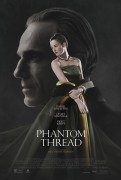Phantom Thread Movie Review
 |
Phantom Thread
Theatrical Release: December 25, 2017 / Running Time: 130 Minutes / Rating: R Writer/Director: Paul Thomas Anderson Cast: Daniel Day-Lewis (Reynolds Woodcock), Vicky Krieps (Alma), Lesley Manville (Cyril Woodcock), Richard Graham (George Riley), Camilla Rutherford (Johanna), Harrient Sansom Harris (Barbara Rose), Brian Gleeson (Dr. Robert Hardy), Julia Davis (Lady Baltimore), Nicholas Mander (Lord Baltimore), Lujza Richter (Princess Mona Braganza), Gina McKee (Countess Henrietta Harding), Philip Franks (Peter Martin), Phyllis McMahon (Tippy), Silas Carson (Rubio Gurrerro) |
Ten years ago, Daniel Day-Lewis and writer-director Paul Thomas Anderson collaborated on There Will Be Blood, which still stands as one of the greatest films and performances of the century. Now they reunite on Phantom Thread, This completely original period drama romance stars the Irish actor as Reynolds Woodcock, a highly respected dressmaker in 1950s England. Woodcock is quickly established as a perfectionist, whose creative genius doesn't exactly extend to people skills. He relies heavily on his sister Cyril (Lesley Manville), a hardworking personal assistant he refers to as his "one and only." Cyril recognizes when Woodcock, a self-proclaimed "confirmed bachelor", has run his course with a woman, which is where his stagnant latest relationship is at, as his girlfriend realizes she'll never come before his work.
While ordering an elaborate breakfast, Woodcock discovers a new muse in Alma (Vicky Krieps), a pretty young woman several rungs beneath him on the social ladder. Soon, Woodcock is charming her and taking an absurd number of measurements of her with the intention of making a dress that is perfectly attuned to her body. Alma moves in and complements the designer's work, modeling his dresses and inspiring him.
But like the others before her, she comes to resent the distance between them. Her effort to narrow the gap, cooking a dinner and sending home all of the workers who are always around the house, backfires in spectacular fashion in what is the film's greatest scene and cinema's greatest use of a vegetable (apologies, Boyhood's "I hate squash" scene). Woodcock and Alma's relationship is complex and neither fixed nor severed with the ease of most movie romances.
To describe Phantom Thread as simply a romance is to sell it short. There are barely any kisses and there are no sex scenes or real lovey-dovey moments. Those familiar with Anderson's Punch-Drunk Love know that he is as capable of telling an enchanting love story as anything else, but as his other films, from Magnolia to The Master, show, he is not one for tidiness and simplicity.
I could go into greater detail regarding the dynamic between Woodcock and Alma, which is rich and as arresting as any relationship the movies have offered this year. But the joys are so greatly enjoyed without expectations that I encourage you to enter the film that way.
Nonetheless, there is much to celebrate about this film. Historical dramas have a reputation for being boring and while that seems like a close-minded approach, I will confess that my two least favorite movies of the year's perceived Oscar contenders -- the underwhelming Dunkirk and the insomnia-curing Darkest Hour -- did nothing to make me care about their characters and worlds. By contrast, Anderson takes a subject of no interest whatsoever to me -- dresses in 1950s London -- and builds a world that fascinates for over two hours straight. There are no lulls. There is none of the pretension that comes from recreating period behavior and speech. Of course, Anderson is no mere storyteller. His considerable craft has been evident from his debut, the 1996 Nevada thriller Hard Eight. And even when the storytelling is a bit of a mess, as it was on his previous film, 2014's Thomas Pynchon adaptation Inherent Vice, there's always some directorial flair and vision to admire. All the better, when that flair is used to sweep you up in a compelling story and universe. Anderson does not rely on convention and tropes. Instead, he creates his own rhythms and melodies to present this unique story in its own special way. At a couple of points, I was reminded of Citizen Kane and The Godfather and while it's premature to put this on the same level of two of what are widely considered to be the greatest American films of all time, it shares with those classics a daringness and originality.
Phantom Thread seems more accessible than Anderson's last two films, the aforementioned Inherent Vice and the heralded but commercially underperforming The Master. While some, like the other esteemed filmmakers Day-Lewis has collaborated with in Martin Scorsese and Steven Spielberg, can occasionally deliver both art and commerce, for Anderson, it's always been about art, even when he gets a big star like Tom Cruise or Adam Sandler to be in his movie. There's a great chance that Phantom Thread may struggle to reach eight figures domestically, even with reviews that are likely to be near-unanimously favorable. That's what happened a year ago to Scorsese's Silence and it is now an overlooked masterpiece that film buffs will delight in discovering.
If this is truly Day-Lewis' final film as an actor, then he is going out on a remarkably high note. To win three Best Actor Oscars in just sixteen lead performances is beyond extraordinary and he should certainly draw a sixth nomination for this performance. The union of director and actor is downright magical, like Scorsese and De Niro used to be. Here are two masters entirely on the same page and there is not even a sliver of doubt in either's work. Day-Lewis is funny, charming, and devilish and so is the film that hosts this turn. I really wish I had seen this more than just a few days before Christmas, when it opened in New York and Los Angeles. If I did, Day-Lewis may very well had earned my Best Actor nomination in my critics organization's awards.
Regardless of what this does at the box office and the extent that the Academy embraces it (and nods in Best Actor and Costume Design seem guaranteed), you should see this film because it is one of the year's most extraordinary.
|
Related Reviews:
DVDizzy.com | DVD and Blu-ray Reviews | New and Upcoming DVD & Blu-ray Schedule | Upcoming Cover Art | Search This Site
DVDizzy.com Top Stories:
Directed by Paul Thomas Anderson: The Master • Inherent Vice • Punch-Drunk Love • There Will Be Blood
Daniel Day-Lewis: Lincoln • Nine | Lesley Manville: Mr. Turner • Maleficent
Now in Theaters: The Post • The Greatest Showman • Downsizing • Call Me By Your Name • The Disaster Artist • Darkest Hour
Text copyright 2017 DVDizzy.com. Images copyright 2017 Focus Features, Annapurna Pictures, Perfect World Pictures, and Ghoulardi Film Company.
Unauthorized reproduction prohibited.

